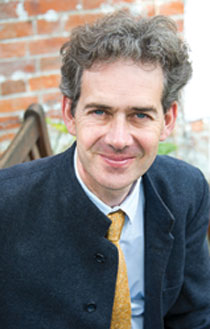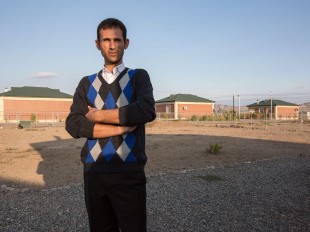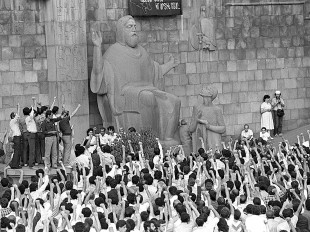Tom de Waal is one of the best-known British commentators on the Caucasus and entire former Soviet region. His authoritative book, Black Garden: Armenia and Azerbaijan Through Peace and War (2003), celebrated its 10th anniversary with a revised edition published by NYU Press in July last year. He is a senior associate in the Russia and Eurasia Program at the Carnegie Endowment in Washington. Anne Thompson-Ahmadova interviewed him for Visions on 12 August, just after the Azerbaijani and Armenian presidents had met in Sochi.
Originally, I was going to start with a general question about the peace process, as 20 years have now passed since Armenia and Azerbaijan signed the cease-fire agreement. As they so often do, though, events have intervened, and I have to start with the escalated fighting on the contact line. Even before July, this year’s death toll was high. In your opinion, what are the probable causes of this escalation?
The first thing to say is that there is no military logic about the fighting across the cease-fire line or across the Armenian-Azerbaijani border. Sometimes one side or the other may gain a few metres, take some high spot of territory, but basically the map doesn’t change.
So I think these cease-fire violations are happening for two reasons: one, some of the lower level clashes are just some kind of mistake; someone opens fire, then there’s a response, and someone unfortunately gets hurt. Or, if we’re looking at the rationale behind the bigger incidents, the two sides are calling each other’s bluff, psyching each other out, testing each other’s military capacity. On the Azerbaijani side, they’re reminding the Armenians that this is not ‘the new normal’ as far as they are concerned, this is a temporary status quo – that’s the Azerbaijani rationale. And if the Armenians are edging forward, then they are telling the Azerbaijanis that ‘you may think that you’ve got a strong military but we’ve got one too’. So it’s a rather macho exchange of messages, political messages, in which unfortunately young men are getting killed.
The meetings of the Azerbaijani, Armenian and Russian presidents in Sochi seem to have had an effect, as there’s been a drop in the reported number of fire exchanges in the last couple of days. What is your view of the meetings?
We only have the public record and indeed it does look as though the violence has diminished, which seems to have been the main reason for convening the meeting. Obviously, as far as Russian President Putin was concerned, this was also an opportunity to present himself as the peacemaker – the then Russian President Dmitry Medvedev did something similar in 2008 after the Georgian war – but it does seem to have had a real effect; there seem to be few incidents of shooting, which is obviously a positive thing. However the general context remains the same.
To answer your question about why this year, why now, well, I think this is all ripples from the Ukraine crisis. There is a general, deeper frustration on the Azerbaijani side about this conflict, as they see the Armenians forging a stronger military relationship with Russia (although Azerbaijan is buying weapons from Russia as well). Also I think there’s a general feeling that the document which has been on the table for several years, this Basic Principles document [on settlement of the conflict – Ed.], is going nowhere. The annexation of Crimea is just another example of territorial conflict; the map of Europe is adding territorial conflicts rather than resolving them. I think in this general mood of frustration and cynicism it’s not a big surprise that there is an upsurge in fighting. It was useful for President Putin in the short term to damp it down, but I don’t see any long-term strategy from the Russians.
Minsk Group
Do you think there’s a future for the Minsk Group in its current form? Do you think Russia, the USA and France can continue to work together?
I think they’ve got no option but to continue, because there’s no other format and clearly neither Armenia nor Azerbaijan want just one of those three countries. They don’t want Russia or the United States in particular to monopolise the peace process, so I think the Minsk Group is set to continue. But there’s a bigger problem, which is that the Minsk Group just doesn’t seem to be achieving anything.
I would turn the question round – how can the Minsk Group achieve anything once the positions of the two sides have hardened? Both the Azerbaijani and Armenian leader are head of a sovereign state, and have very high expectations about what’s acceptable in resolving this conflict. That means that if the Minsk Group ambassadors and mediators don’t want to force a peace agreement, which I don’t think they have the capacity or will to, then it’s dependent upon the will of the parties as to what they agree to, and the parties can’t agree.
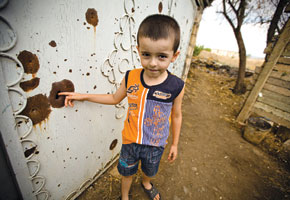 Life on the front line: a child in Chiraqli, Aghdam District, points at the bullet holes in the door to the family property, August 2014. Photo: Abbas Atilay
Life on the front line: a child in Chiraqli, Aghdam District, points at the bullet holes in the door to the family property, August 2014. Photo: Abbas Atilay Peace moves
In the light of that, what do you think could be done to move the peace process forward?
I think, again, if there is more political will from the two parties, then that in turn could release some energy and resources internationally, but I don’t see it becoming international. Some things that Baku and Yerevan could do – I think they could certainly set up a separate channel of communication between the two presidents which means that they wouldn’t have to rely on three foreign mediators, they could talk directly. I think that would be a big step forward.
Equally, the Minsk Group should be talking more seriously about what a security operation, what a peacekeeping operation, would look like. I think Russia, France and the US agree on what they want, but they don’t agree about what the post-conflict security arrangements should look like and whether the Russians should be involved – so I think it would be helpful to have that conversation. Equally, I can understand that if you’re John Kerry or indeed Sergey Lavrov or President Vladimir Putin, why spend hours and hours, days on this issue, when you have rather more pressing business to attend to.
Alienation
When was the last time you were in the region, Azerbaijan or Armenia? I was in Azerbaijan last November. I haven’t been to Armenia for a year, but I am going this September, so not very recently.
And occupied Karabakh?
I haven’t been to Karabakh for two years now.
Both from your visits and contacts or conversations, have you felt any changes in attitude towards the conflict in the last two or three years?
Although these two neighbours had a lot in common, and still do have a lot in common – when Armenians and Azerbaijanis meet in Georgia, outside the conflict zone, they have absolutely no problem in communicating with one another – I think that unfortunately they have completely grown apart. It gets harder with each year that passes to imagine Armenians living in Azerbaijan again or Azerbaijanis living in Armenia or Karabakh again. They’re just becoming more alienated from one another.
We know that the international plan envisages the return to Azerbaijan of the occupied territories around Nagorno-Karabakh – Aghdam, Fizuli etc. – but when I was last in Karabakh it was hard to tell where the border was. We were just driving along a road and I said, “Where are we now?” And they said, “Oh, we’re in Aghdam region now,” but there was no border sign. What I mean to say is that as every year goes by, the Karabakh Armenians get more used to the idea that they can control the occupied territories. It’s a very dangerous development.
In Azerbaijan you have to be middle-aged now to remember living peacefully with Armenians. This makes it harder and harder, unfortunately.
When you were in Aghdam District of Karabakh, did you see evidence of recent settlement?
I think the only place which has been settled seriously is Lachin; the Armenians assume that they will keep the Lachin corridor [connecting Nagorno-Karabakh with the territory of the Republic of Armenia – Ed.] under some kind of special arrangement. There are also a few people living in Kelbajar. This is possibly one of the slightly more positive things, we’re not talking about Israel and the West Bank; the number of people physically living in the occupied territories is quite small, but farmers are ploughing fields there. For example, an archaeological museum was opened in Aghdam region where they found a whole Armenian basilica and so on. Maps are being published which blur the lines, so that, unfortunately, is also going on. It’s more psychological than actually physical.
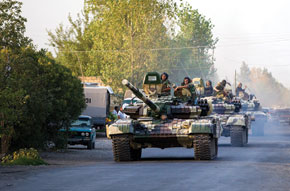 Azerbaijani troops move to defend the contact line in Aghdam District, August 2014. Photo: Abbas Atilay
Azerbaijani troops move to defend the contact line in Aghdam District, August 2014. Photo: Abbas Atilay Core assumptions
How much of a priority do you think Nagorno-Karabakh is now for people in Armenia?
Well, I think it’s hard to say whether it’s a priority. Obviously, in all these countries the priority is getting by day to day; it’s the economy, all the bread and butter issues, but the moment a peace deal is announced – and if a peace deal is ever announced it will be seen by some Armenians as a betrayal – then people will come out onto the streets against it. I think that’s inevitable. It’s a kind of sleeping giant, but the moment people start talking about a change in the status quo, the giant stirs. Certainly I think most Armenians assume that “Karabakh is ours”; that’s their core assumption.
It’s a long way ahead, but when Serzh Sargsyan stands down at the end of his second term as Armenian president in 2018, he’ll be the last of the politicians actively involved in the Nagorno-Karabakh conflict. Do you think that will make a difference?
That cuts both ways. An Armenian friend of mine describes Serzh Sargsyan as the “last of the Mohicans” and says that Armenia will be a different place when he’s gone. One would reasonably expect that after 20 years of Karabakhi rule, an Armenian from the Republic of Armenia would be the next leader. Having said that, it’s hard to imagine that Serzh Sargsyan will go away, certainly he will remain behind the scenes.
I think the fundamentals of this are bigger than any one individual. If one were to have the Dalai Lama in Armenia and Nelson Mandela in Azerbaijan and they asked them to make peace, they would still have a difficult time of it, given what the societies expect and what the societies have grown up with.
Another Alsace?
Those are all thought-provoking answers, thank you. Are there any observations you would like to add?
A new edition of the book Black Garden came out last year – I think it’s worth talking about some added reportage which I thought was interesting. I went to this village in Georgia called Khojorni which is just a couple of miles from the Armenian border maybe, and 20 miles from the Azerbaijani border. It’s one of the few villages in southern Georgia that has a mixed Armenian-Azerbaijani population; in this case, three-quarters are Azerbaijani, one-quarter Armenian, and they all speak each other’s language. Most of the young people have left for economic reasons. I think it says a lot that in that village there are people, just a few miles inside Georgia, Armenians and Azerbaijanis, living together as neighbours with absolutely no problems with one another. I think people need to be reminded of that. There’s no ethnic incompatibility here; the two peoples can still get along, they go to each other’s weddings and funerals.
It’s all about the politics of it, and the security. In Khojorni there’s a Georgian policeman; if someone’s window gets broken or they’re abused, they can go to that policeman who will sort it out. If you wish to expand the village and create a peaceful settlement, you do need a policeman; there has to be an international policeman. In fact if that international policeman can be installed, then I do see that eventually – it won’t happen overnight, but in a generation or two – Azerbaijanis and Armenians can be living together, and Karabakh will be the Alsace of the Caucasus.
